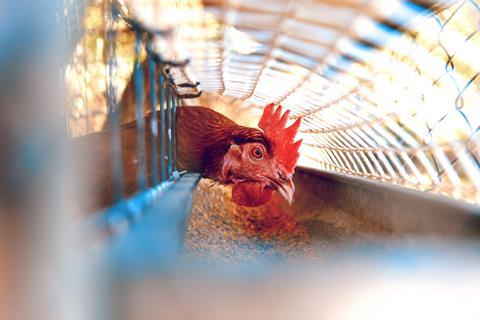Christians have biblical and historical reasons to defend the rights of animals, says Joyce D’Silva. So why are most leaders silent on the issue?

Our pets are the lucky ones.
I know someone who spent over £600 on medication for their ageing goldfish. Another is spending a fortune on treatment for a terminally ill rescue dog and are giving him gentle palliative care.
We sincerely love our companion animals and most of us do our very best by them. Which is beautiful.
One would rather be a much-loved pet than an animal in a laboratory or a factory farm. These animals do not have names and their numbers are sky-rocketing. Every year over 80 billion farmed animals are slaughtered for their meat, as well as trillions of fish. Around 192 million animals are used in experiments every year, some to aid medical progress, others for testing cosmetics or cleaning products.
It really is an anomaly that we separate similarly intelligent animals such as dogs and pigs into separate categories - one category where we care for them and another where we eat them, often without thought as to how they have been reared.
Whoever injures the dignity of animals, injures God
Can Christian teaching help us? In Genesis (1:9) God appears to prescribe a plant-based diet for humanity and after the flood he makes his new covenant with humanity but also “with every living creature that is with you, of the fowl, of the cattle and of every beast of the earth with you” (9:10).
Scripture does allow the eating of some animals. But Proverbs also tells us that “a righteous man regardeth the life of his beast” (Proverbs 12:10). It begs the question - can a factory farmer, keeping maybe 40,000 hens in cages or 1,000 pigs on concrete-floored sheds really “regardeth” their lives?
Jesus uses a beautiful analogy of the care a mother hen has for her chicks when despairing of bringing the people together himself (Luke 13:34). He repeatedly makes use of the analogy of the good shepherd, especially when addressing Simon Peter shortly before his crucifixion (John 21:15-17). Might his teaching “Blessed are the merciful” (Matthew 5:7) extend beyond having mercy only towards humans, but also to animals?
Over the centuries, Christian teaching seems to have divided into two camps. One follows the teaching of Thomas Aquinas (1225-74), that animals are here for the sake of humans. Even Martin Luther (1483-1546) declared that “the beasts of the field and the birds of heaven were created for mankind: these are the wealth and possessions of men”.
The other view of kinship with animals is seen in the stories of the early saints, especially those who lived as hermits and often made gentle bonds with wild creatures. The most famous exemplar of this vision is of course St Francis of Assisi (1181-1226), who viewed animals as brothers and sisters, who rescued lambs going for slaughter and apparently did a deal with the local wolf who was threatening the townsfolk. His outlook was imitated by his biographer, St Bonaventure (1221-74), who wrote, “For every creature is by its nature a kind of effigy and likeness of the eternal Wisdom. Therefore, open your eyes, alert the ears of your spirit, open your lips and apply your heart so that in all creatures you may see, hear, praise, love and worship, glorify and honour your God”.
A more recent example of compassionate concern for animals was the evangelical Christian William Wilberforce (1759-1833), who not only campaigned vigorously for the end of the slave trade and slavery itself, but who, with his Anglican friend, Rev Arthur Broome, founded what we now know as the RSPCA.
Lutheran theologian Dr Jurgen Moltmann declares “whoever injures the dignity of animals, injures God”. Pope John Paul II wrote, “the compassion of the Lord extends to every living creature”. Twenty years later Pope Francis declared, “we are not disconnected from the rest of creatures but joined in a splendid universal community”.
Dr David Clough, Chair in Theology at Aberdeen University, urges Christians “to reclaim the connection between concern for animals and Christian faith and be in the vanguard of campaigns to resist production systems that have no regard for the flourishing of animals”. The organisation SARX – for all God’s creatures which seeks to empower Christians to do more for animals. Their website is well worth a visit.
There are such voices within the Christian fold, who are calling on Christians to have compassion for all creatures. But there are not enough voices echoing their concern. Perhaps this is a true challenge for Christian leaders to speak out for our fellow creatures and help to bring an end to their suffering.
Can we follow the example of Saint Isaac the Syrian, who wrote, in the seventh century, “What is a merciful heart? It is a heart on fire for the whole of creation, for humanity, for the birds, for the animals…”
Animal Welfare in World Religion by Joyce D’Silva (Routledge) is out now



































No comments yet